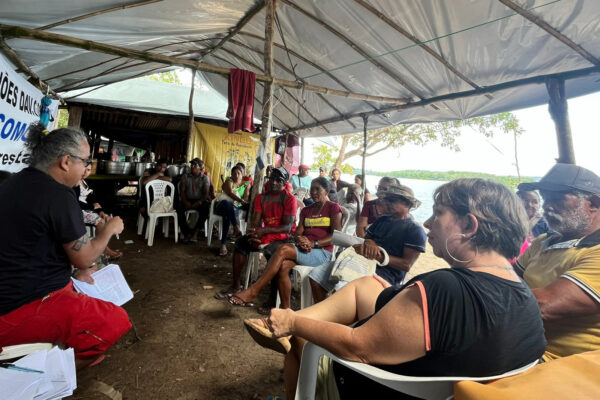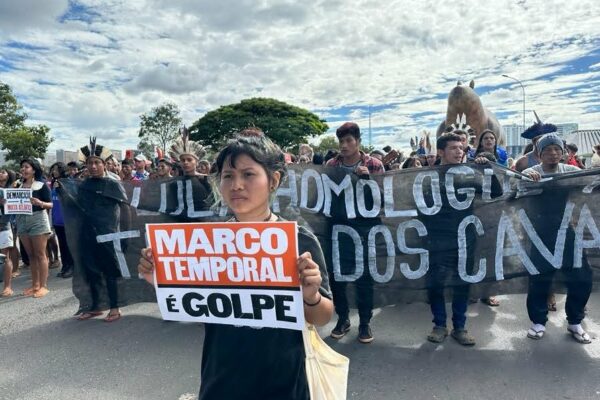Medellin, Colombia, March 27 – In what a coalition of civil society organizations from across Latin America referred to as “business as usual”, the president of the Inter-American Development Bank, Luis Alberto Moreno and senior managers, failed to address their concerns regarding a planned capital replenishment of the Bank, during a meeting prior to the IDB’s 50th anniversary celebrations in Medellin, Colombia.
The meeting, which is part of the Bank’s remit that it be annually required to respond to civil society concerns, took place during an alternative gathering of many organizations that chose not attend in an expression of frustration for the lack of IDB transparency.
Instead, more than 500 people participated in a People’s Assembly of IDB Creditors to demand the Bank pay its social, ecological and economic debts, generated by its failed policies and projects across Latin America.
“We are organizing and mobilizing as people affected by IDB projects, and we will get the Bank to listen to us,” said Paula Fansinete Silva, from the Brazilian Movement of People Affected by Dams and the Jubilee South/Americas network, after condemning the outrages committed against her community by the Cana Brava company.
“I don’t want to drink their champagne or eat their canapes,” said Margarita Florez, from the Latin American Institute of Alternative Legal Services (ILSA) in Colombia, who was one of several thousand protesters who took to the streets of central Medellin on Thursday. “I simply want to know why the region’s poor are largely worse off than they were 20 years ago in spite of – or often, because of – the Inter-American Development Bank, which hasn’t learned any lessons in its 50 years of operation. It’s business as usual.”
Among those who attended the meeting with IDB President Luis Alberto Moreno and other bank directors, was Vince McElhinny from the Washington-based Bank Information Center (BIC). Referring to Moreno’s intention to request a replenishment of IDB capital after being forced to admit recent losses amounting to almost $2 billion, McElhinny commented:
“Moreno is completely out of touch with what is happening in the region, and just sees the current crisis as an opportunity to obtain more money for a bank that has an appalling development record. Unsurprisingly, the meeting reflected the IDB’s consistent antipathy toward substantive debate.”
“We asked what role we have in discussing core concerns about replenishment,” said Juan Carballo from the Argentinean NGO, Center of Human and Environmental Rights (CEDHA). “The answer was the IDB is moving forward with replenishment and, despite our requests and the Bank’s mandate, allows no space for civil society participation”. Carballo asked for more access to information, the implementation of a proper system of accountability and greater participation by civil society in IDB lending decisions.
When informed by Vellutini that the IDB’s shareholders were entitled to confidentiality, Alberto Croce from Latin Debt, said that given the fact that the Bank was created as a public institution funded by the region?s governments, its directors “are our representatives who handle public funds. We are all its shareholders.”
Diego Rodriguez, from the Argentinean NGO M’Bigua, observed there has been no change in the relationship between the IDB and civil society. “We don’t expect our suggestions and comments to be systematically ignored year after year. We expect a dialogue. Today, once again, there was no dialogue. As the IDB moves forward to advance recommendations for a Ninth Replenishment, the lack of accountability for the current financial crisis engulfing the region stands in stark contrast to the Bank’s naked ambition to position itself as the champion of its own victims.”
An IDB strategy during the Medellin assembly is to restrict the dissemination of civil society organization literature within the assembly buildings. The coalition continues to protest this policy. The most recent editions of “BID en la Mira” (IDB Watch) are in Spanish and may be found at www.amazonwatch.org or www.frentebid.org.
The coalition represents 42 civil society groups and organizations across the Americas.













